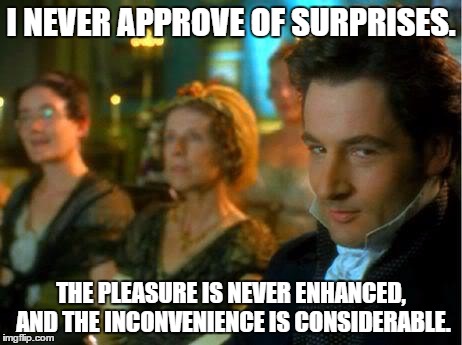In Jane Austen’s classic Emma, someone gives to someone else a surprise—of a pianoforte. It was all the buzz of the elite community.
But Mr. Knightley had a different take. In the movie version he said,
Now, I know that small surprises can be fun (I’ve experienced a few of those), and perhaps for some the pleasure is enhanced, so I know there are exceptions. I wouldn’t say I never approve of surprises. Just in general, and especially with really big ones, like the inconvenient pianoforte kind.
And it’s not only the stress of trying to keep it a surprise that’s the problem, the secrets and stress and lying and stress and twice as much planning . . . and so much trouble and stress.
Not only that.
Even more, I think, is the sadness to me that the recipient misses the anticipation.
When something good is going to happen, isn’t a big part of the goodness looking forward to it?
Isn’t part of the goodness of Christmas waiting with expectation for its arrival?
Anticipating.
Expecting.
As I’m thinking about what I’ll be writing in my next Untwisting Scriptures book, I’m considering the false teaching that we shouldn’t expect anything from anyone, even God, so we’ll never be disappointed. I want to enlarge on that false teaching more in days to come, but for right now, I want to revel in the beauty of anticipation, expectation. As Psalm 62:5 says,
The concept of anticipation is all through the Scriptures, permeating the Scriptures.
It’s called HOPE.
Far from being the maybe-I’m-not-sure-but-it-would-be-so-great-if-it-could-happen kind of hope we’re used to, Biblical hope is solid and sure, as solid and sure as Christmas coming.
The promised Messiah, that the whole earth groaned for, was coming.
The final deliverance that the whole earth groans for even now is coming.
Deliverance from that sin that grips you around the wrists and ankles, you can trust that by the power of Christ you can expect that too.
The joy that Jesus said we could have—it’s available through Him. There is hope. You can expect, can anticipate that it’s coming.
If you’re an abuse survivor, you can know who you really are, not just what the abuser has said you are. You can anticipate knowing your true identity.
I don’t want this to come across as sounding simplistic. Reaching the goal can be a very long road. It can be very hard in places, even dark and frightening. On one path I walked through in a time of great spiritual darkness, for example, I felt like I was walking through fire or walking between two rows of roaring lions.
I’m praying with someone now whose children, because of a faulty court system, are in harm’s way. I don’t mean to say there won’t be warfare. There will—the Scriptures tell us so. We fight through prayer and faith.
But in faith when we pray for deliverance, we can expect it. This is the promise of God.
This is the HOPE of the resurrection. Not only do we not need to feel guilty about expecting gifts from God in the spirit realm, but He even wants us to expect them. Much of what He offers is made available through an awareness of who we truly are, in Him, and what He has truly done for us and given us.
The answers may still come as surprises, because God delights to answer our expectations in different ways. I think that’s the best kind of surprise, one that we know is coming, but we’re not quite sure exactly how or when.
In faith we anticipate God’s work, His accomplishments, and His gifts. As we see them fulfilled, in small ways as well as big ways, our faith grows, and we can revel more and more in the goodness of God.
***
Go here to download your free Guide, How to Enjoy the Bible Again (when you’re ready) After Spiritual Abuse (without feeling guilty or getting triggered out of your mind). You’ll receive access to both print and audio versions of the Guide (audio read by me). I’m praying it will be helpful.


